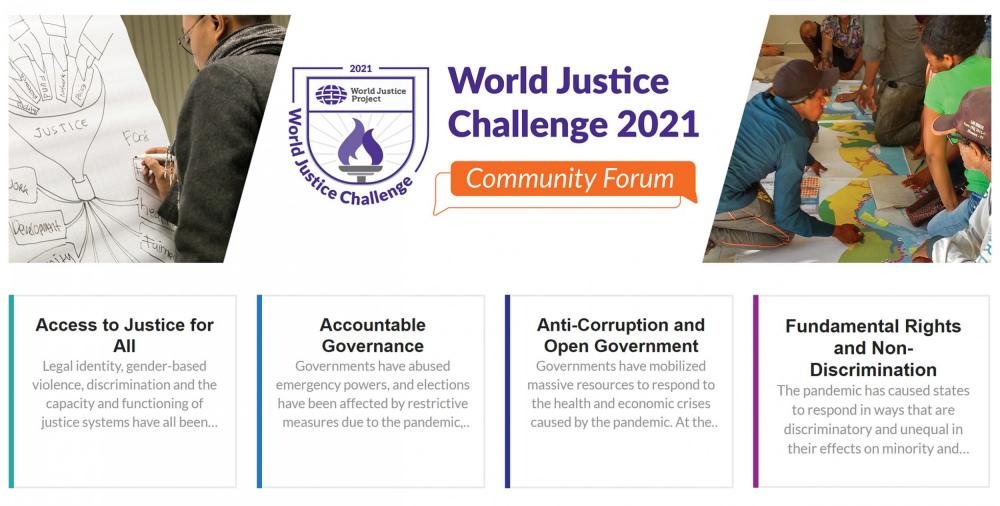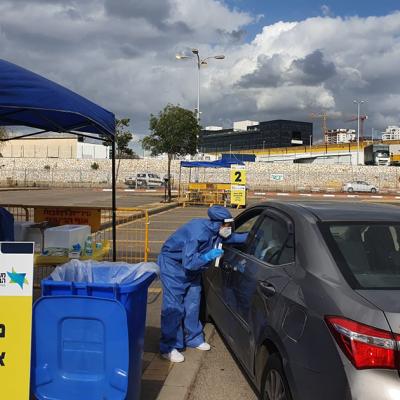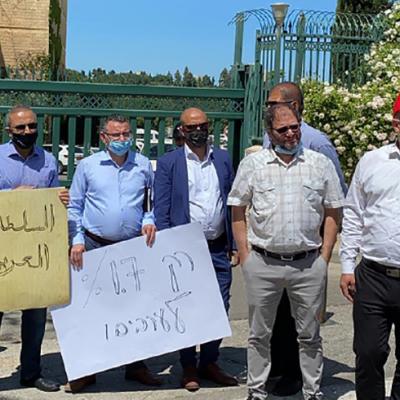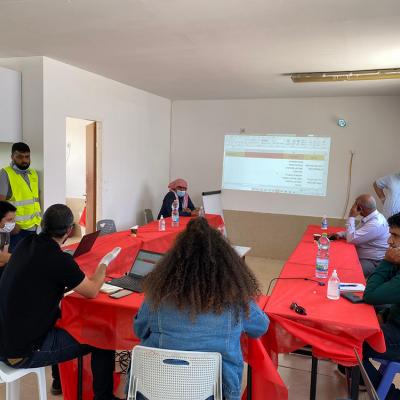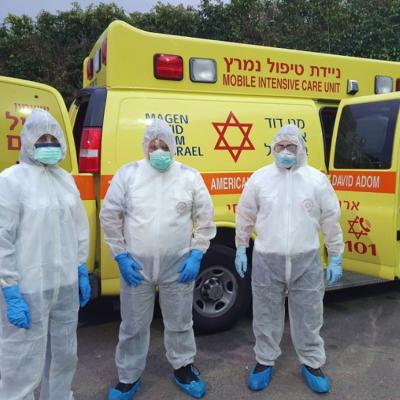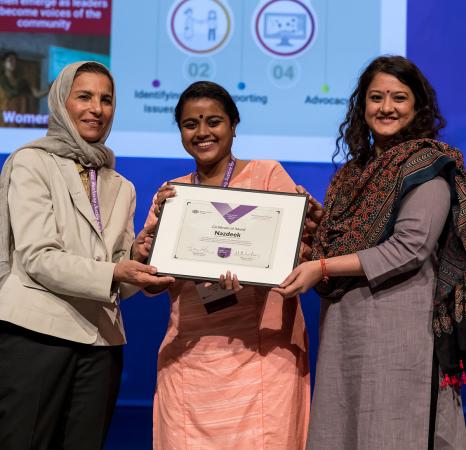World Justice Challenge 2021 Winner!
Fundamental Rights and Non-Discrimination
Project Pitch and Q&A
Watch Adalah's World Justice Challenge project pitch and join WJP's World Justice Challenge 2021 Community Forum to ask questions to project representatives, explore additional resources, meet new colleagues, and more. Join the discussion and help us build stronger rule of law values, institutions, and communities around the world.
Ask your question at the Community Forum
Project Summary
Adalah's Emergency COVID-19 project uses legal action before Israeli courts and state authorities, together with media outreach, to obtain remedies for discrimination faced by the Arab minority, around 20% of the population of Israel. From the outset, the Israeli Government neglected the needs of Arab citizens in areas like access to health services, distance learning, public information, economic support, and the right to privacy. Adalah has undertaken over 40 legal actions, including 15 Supreme Court petitions, and achieved positive legal results, including the provision of COVID-19 testing, more equitable allocation of public funds for Arab towns, and civil liberties protections.
Problem Statement
The project addresses the problem of discrimination against Arab citizens of Israel, a national, homeland minority group that comprises about 20% of the population, during the COVID-19 (C19) crisis. From the start of the outbreak, the Israeli Government acted discriminatorily in its interventions to protect people's lives and wellbeing, in areas including access to healthcare, distance learning, information, economic stimulus measures, and the right to privacy/civil liberties. This discrimination has deepened the long-entrenched structural discrimination faced by Arab citizens.
The Arab minority includes vulnerable sub-groups like the Bedouin in the Naqab (Negev) desert in southern Israel, women, and children. These groups are often at greatest risk from C19, but afforded the least rigorous protections.
Adalah's project has challenged discriminatory state policies before the Israeli legal system, including:
- The inaccessibility of online distance learning during nationwide school closures for around 50,000 Bedouin children in the Naqab living in unrecognized villages that the state has not connected to the electricity grid or the Internet.
- The emergence of major gaps in access to emergency medical services, C19 testing, and isolation facilities for Arab citizens of Israel compared with Jewish Israelis, and for prisoners.
- The unequal rollout of economic stimulus measures to assist workers, households, small businesses, and communities to face the pandemic, including grants to unemployed youth and Arab local authorities.
- The state's failure to collect and publish comprehensive, disaggregated data on C19 cases among Arab citizens of Israel and their communities.
- The failure of key ministries to provide updated essential C19 public health information in Arabic, posing a serious threat to the Arabic-speaking public.
- The Government's excessive reliance on emergency regulations during the first months of the pandemic; the government decreed dozens of such regulations without parliamentary oversight; many led to human rights violations against Arab and Jewish citizens of Israel.
Project Description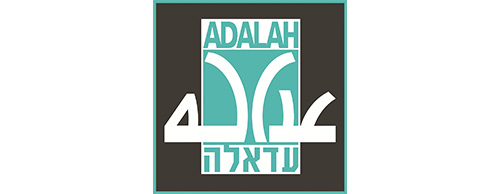
Adalah has worked to solve this problem by pursuing legal cases in the Israeli courts to obtain concrete remedies for discrimination against Arab citizens of Israel during the C19 crisis. The project has achieved several positive legal results, including the increased provision of C19 testing and health information, allocation of emergency state funds for Arab towns and citizens, and civil liberty protections. While the primary target population is the Arab minority, some policy changes have also benefitted the wider Israeli Jewish population. Successes achieved include:
- Opening C19 testing centers in the Naqab, Triangle, and Upper Galilee, areas with an Arab majority, following Adalah's Supreme Court petitions.
- The publication of additional, timely information on C19 in Arabic on the Health Ministry's website, previously published only in Hebrew. The Ministry also opened an Arabic Facebook page for C19-related information, moves made in response to Adalah's urgent letters.
- A decision in December 2020 to amend a policy that excluded tens of thousands of Arab Bedouin citizens living in villages unrecognized by the state from receiving emergency C19 food aid, increasing the accessibility of aid to those most vulnerable to food insecurity.
- The cancellation in April 2020 of Emergency Regulations allowing around 4,000 pregnant women to be fired without a special permit from the Labor Ministry, following Adalah's Supreme Court petition.
- Securing NIS 200 million (US $57 million) in state funds in May 2020 for Arab local municipalities to mitigate C19-related financial damages. The funds were committed following Adalah's Supreme Court petition demanding the equitable distribution of financial aid to local authorities. Arab municipalities had been slated to receive just 1.7% of aid to municipalities nationwide.
- A Supreme Court decision from April 2020 accepting Adalah's argument that the Israeli Government had no legal authority to use and expand the powers of the Shin Bet security services for cellphone surveillance of coronavirus patients and all citizens.
- A decision announced by the Justice Ministry in October 2020 to halt home demolitions for planning violations during the C19 emergency, in response to Adalah's legal letter. The vast majority of demolitions are carried out against Arab and Arab Bedouin citizens' homes.
- A Supreme Court ruling in August 2020 criticizing the Government's declaration of dozens of emergency regulations without Knesset oversight, in violation of the rule of law. The ruling came in response to a petition filed by Adalah and the Joint List political party.
Project Impact and Potential for Scaling, Replication, and Sustainability
The project is based on a comprehensive, responsive and proactive approach to tackling the problem of institutionalized discrimination against the Arab minority in Israel in the context of the C19 crisis. To date, Adalah has brought over 40 legal cases before the courts and state authorities to seek timely remedies for concrete instances of discrimination through this project. The project template may be adapted by other legal actors to demand rights protections for other minorities facing institutionalized discrimination that have been worsened by state responses to the pandemic.
Adalah will continue to challenge the Israeli Government's response where it leaves Arab communities in Israel unnecessarily exposed to the pandemic and its after-effects. The continued impact of the project is expected to include the mitigation of discrimination in state measures to secure health, education, and economic recovery from the crisis, encompassing economic recovery packages, the availability of C19 testing and emergency medical services, vaccines and future treatments, and any steps to assist Arab children in narrowing the gaps that have grown between them and their Jewish Israeli peers during school closures.
The project could be scaled up to include additional aspects within the economic sector, to encompass broader economic justice work aimed at preventing further widening of existing inequalities and spikes in poverty levels among the Arab minority. The C19 pandemic is expected to have a long-lasting economic impact, and we anticipate that Arab citizens are likely to be deprioritized or excluded from state recovery plans, e.g. the provision of loans and other forms of financial assistance to struggling businesses, measures to help youth into work and to curb youth unemployment, and new public works/infrastructure projects to stimulate local economies.
Specific project cases can also serve as examples in other contexts, e.g. a precedent-setting legal case that Adalah brought against contact tracing and monitoring of C19 patients and those who came in contact with them by the Israeli Shin Bet intelligence service. Adalah has been contacted by multiple organizations and practitioners in other countries seeking information about the case and its potential replicability. Similarly, litigation brought by Adalah against Israel's dozens of C19 Emergency Regulations reflects issues relevant in other countries, e.g. the exploitation of the pandemic as a national security issue rather than a public health issue, the constitutional role of the government versus the legislature in a civil emergency, and the involvement of the security services in civilian matters.
Featured Resources
- Adalah Newsletter - April 2020 (PDF)
- +972 Magazine: "How Palestinian citizens are putting Israel’s coronavirus powers in check" (May 2020 - PDF)
- Report by Adalah to UN Special Rapporteurs and Independent Experts in Response to Joint Questionnaire on COVID-19 and Human Rights (July 2020 - PDF)
Key Project Links
Social Media: Facebook, Twitter, YouTube, Instagram
Website: adalah.org
Submit Your Questions and Get Ready to Pick a Winner!
Representatives of World Justice Challenge 2021 finalist projects are on hand to answer your questions. Join our online Community Forum to engage with finalists, share resources, and network with other members of the rule of law community. Submit your questions now and get ready to vote for your favorite project—voting opens in mid-April!
Join the Conversation
